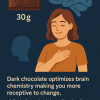The 30-Minute Goal Revolution
Why Your Big Dreams Keep Failing (And the Science-Backed Fix)
━━━━━━━━━━━━━━━━━━━━━━━━━━━━
Your Goals Are Dying a Slow Death
And research shows exactly why—plus a surprising solution ━━━━━━━━━━━━━━━━━━━━━━━━━━━━
Sarah stared at her vision board, covered in magazine cutouts of fit bodies, dream homes, and inspiring quotes. Three months later, nothing had changed. Sound familiar?
Most people experience this crushing cycle: Set ambitious goals → Feel motivated for a week → Watch life get in the way → Abandon ship by February.
The truth is, research suggests that most New Year's resolutions fail within weeks. Studies indicate anywhere from 23% quit by the end of the first week to 80% failing by February. But here's what nobody tells you—it's not your fault. You're using a broken system.
🎯 The Goal-Setting Trap Nobody Talks About
Remember that surge of excitement when you wrote down your goals? That feeling is actually part of the problem. Research by Peter Gollwitzer found that telling people about your goals can substitute for actually taking action—your brain gets a hit of satisfaction just from declaring intentions.
"Motivation had no significant effects on exercise behavior."
Here's the kicker: 91% of people who planned their intention to exercise by writing down when and where they would exercise each week ended up following through. Meanwhile, the group that just read motivational content? Zero improvement.
The Three Goal Killers:
🔹 Analysis Paralysis - Overthinking instead of acting
🔹 The Motivation Myth - Waiting to "feel ready"
🔹 Vague Intentions - "I'll exercise more" vs. specific plans
Visual Break: Your Brain on Goals
Traditional Goals: "Lose weight" → 😰 → 🤷♂️
Implementation Plans: "Monday 7am gym" → ⚡ → ✅
💡 The Science of Goals That Actually Stick
Decades of research reveal what really works. Over 90% of Goal Setting Theory studies confirm positive effects when you follow specific principles.
Meta-analysis of 94 independent tests showed that implementation intentions had a positive effect of medium-to-large magnitude (d = .65) on goal attainment. That's psychology-speak for "this stuff really works."
The Magic Formula: If-Then Planning
Instead of vague goals, create what researchers call "implementation intentions":
Traditional Goal: "I want to get fit"
Implementation Intention: "If it's 6:30 AM on weekdays, then I will put on my running shoes and walk out the door"
This simple shift engages your brain's automatic response system. Research confirms that the chosen goal-directed behavior will be performed automatically and efficiently, without conscious effort.
<expandable> **Why This Works:** - Removes decision fatigue - Creates environmental triggers - Bypasses the "motivation requirement" - Builds genuine habits, not wishful thinking </expandable>
🚀 Three Research-Backed Benefits of Strategic Goal-Setting
1. ⚡ Immediate Action (Not Someday Syndrome)
Research shows you are 2x to 3x more likely to stick to your goals if you make a specific plan for when, where, and how you will perform the behavior. No more "I'll start Monday" excuses.
2. 💪 Accountability That Actually Works
Dr. Gail Matthews' study at Dominican University found that people who share their goal with another person have a 65% chance of success. Add accountability check-ins, and your likelihood of goal achievement rises to 95%. But remember—sharing must come with action plans, not just declarations.
3. 🧠 Flow State Activation
Research shows clear goals significantly increase the likelihood of achieving "flow" at work, which improves performance. Imagine being so engaged that time flies and work feels effortless.
🔬 Overcoming Your Inner Saboteur
"But I've tried everything..."
The truth is, willpower is overrated. Research found that there is an inverted U-shaped relationship between difficulty and performance. Too easy = no effort. Too hard = give up. The sweet spot? Challenging but believable.
"I don't have time for complicated systems..."
That's exactly why a 30-minute intervention could change everything. Unlike traditional approaches requiring months of effort, focused sessions can install new thinking patterns immediately.
"What if I fail again?"
Research shows it's important to be resilient in the face of adversity. Reassess your goals and make alterations when you feel it is necessary. Goals should evolve with you, not chain you down.
<pull-quote> "[Goals that are written are concrete and motivational](https://www.psychologytoday.com/us/blog/the-moment-youth/201803/goal-se…). Making progress toward written goals increases feelings of success and well-being." </pull-quote>
✨ Your 30-Minute Transformation Awaits
━━━━━━━━━━━━━━━━━━━━━━━━━━━━
In just 30 minutes, you could:
✓ Transform vague wishes into automatic actions
✓ Learn evidence-based techniques that stick
✓ Break free from the motivation-procrastination cycle ━━━━━━━━━━━━━━━━━━━━━━━━━━━━
Imagine having a personalized session that helps you create implementation intentions for your specific goals. No generic advice, no one-size-fits-all plans—just you and proven strategies tailored to your life.
Mind Hack Lab's single-session approach draws from cognitive behavioral techniques and implementation science to help you build a custom action plan in one focused session. Because Making an implementation plan is what distinguishes a goal from a hope.
[Start Your Goal Revolution →] Transform wishes into reality
[Learn More →] See how single sessions work
The Bottom Line: Your goals don't need more motivation—they need better science. And that science says one focused session could be all it takes to finally bridge the gap between dreaming and doing.





